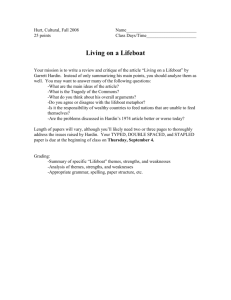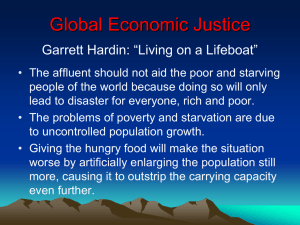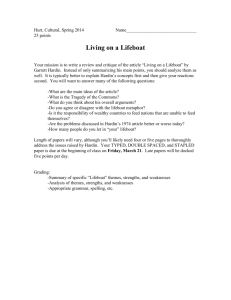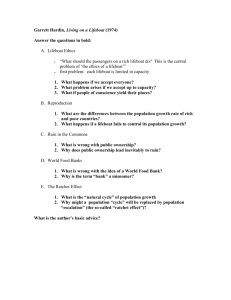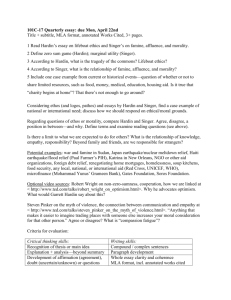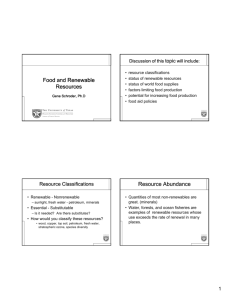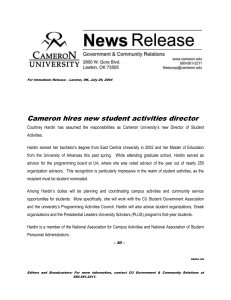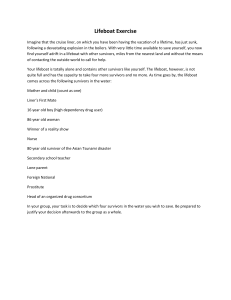“Lifeboat Ethics: The Case Against Helping the Poor”
advertisement
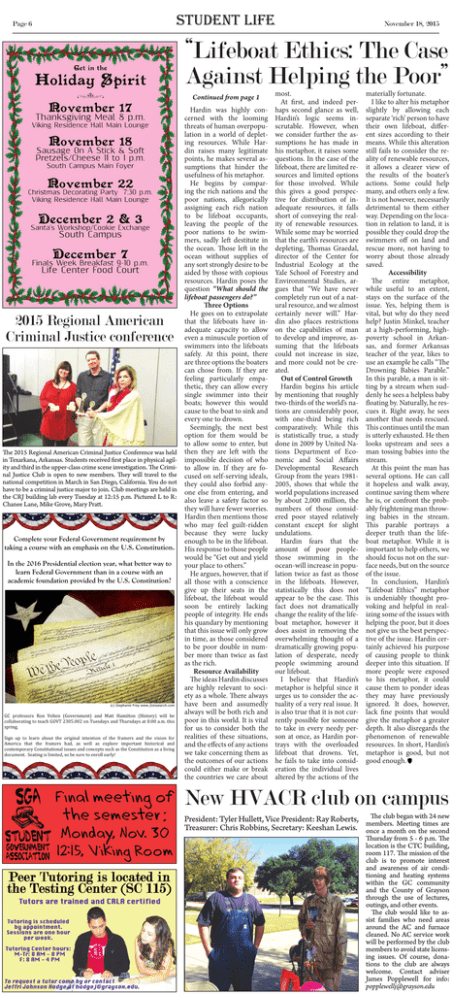
Student Life Page 6 e “Lifeboat Ethics: The Case Against Helping the Poor” Continued from page 1 Hardin was highly concerned with the looming Viking Residence Hall Main Lounge threats of human overpopulation in a world of depleting resources. While Hardin raises many legitimate Sausage On A Sick & Sof Pretzels/Cheese 11 to 1 p.m. points, he makes several asSouth Campus Main Foyer sumptions that hinder the usefulness of his metaphor. He begins by comparing the rich nations and the Christmas Decorating Party 7:30 p.m. Viking Residence Hall Main Lounge poor nations, allegorically assigning each rich nation to be lifeboat occupants, leaving the people of the Sana's Workshop/Cookie Exchange poor nations to be swimSouth Campus mers, sadly left destitute in the ocean. Those left in the ocean without supplies of Finals Week Breakfas 9-10 p.m. any sort strongly desire to be Life Center Food Cour aided by those with copious resources. Hardin poses the question “What should the lifeboat passengers do?” Three Options He goes on to extrapolate that the lifeboats have inadequate capacity to allow even a minuscule portion of swimmers into the lifeboats safely. At this point, there are three options the boaters can chose from. If they are feeling particularly empathetic, they can allow every single swimmer into their boats; however this would cause to the boat to sink and every one to drown. Seemingly, the next best option for them would be to allow some to enter, but The 2015 Regional American Criminal Justice Conference was held then they are left with the in Texarkana, Arkansas. Students received first place in physical agil- impossible decision of who ity and third in the upper-class crime scene investigation. The Crimi- to allow in. If they are fonal Justice Club is open to new members. They will travel to the cused on self-serving ideals, national competition in March in San Diego, California. You do not they could also forbid anyhave to be a criminal justice major to join. Club meetings are held in one else from entering, and the CRJ building lab every Tuesday at 12:15 p.m. Pictured L to R: also leave a safety factor so Chanee Lane, Mike Grove, Mary Pratt. they will have fewer worries. Hardin then mentions those who may feel guilt-ridden because they were lucky enough to be in the lifeboat. His response to those people would be “Get out and yield your place to others.” He argues, however, that if all those with a conscience give up their seats in the lifeboat, the lifeboat would soon be entirely lacking people of integrity. He ends his quandary by mentioning that this issue will only grow in time, as those considered to be poor double in number more than twice as fast as the rich. Resource Availability The ideas Hardin discusses are highly relevant to society as a whole. There always have been and assumedly always will be both rich and poor in this world. It is vital for us to consider both the realities of these situations, and the effects of any actions we take concerning them as the outcomes of our actions could either make or break the countries we care about Thanksgiving Meal 8 p.m. 2015 Regional American Criminal Justice conference SGA Student Government Association November 18, 2015 most. At first, and indeed perhaps second glance as well, Hardin’s logic seems inscrutable. However, when we consider further the assumptions he has made in his metaphor, it raises some questions. In the case of the lifeboat, there are limited resources and limited options for those involved. While this gives a good perspective for distribution of inadequate resources, it falls short of conveying the reality of renewable resources. While some may be worried that the earth’s resources are depleting, Thomas Graedal, director of the Center for Industrial Ecology at the Yale School of Forestry and Environmental Studies, argues that “We have never completely run out of a natural resource, and we almost certainly never will.” Hardin also places restrictions on the capabilities of man to develop and improve, assuming that the lifeboats could not increase in size, and more could not be created. Out of Control Growth Hardin begins his article by mentioning that roughly two-thirds of the world’s nations are considerably poor, with one-third being rich comparatively. While this is statistically true, a study done in 2009 by United Nations Department of Economic and Social Affairs Developmental Research Group from the years 19812005, shows that while the world populations increased by about 2,000 million, the numbers of those considered poor stayed relatively constant except for slight undulations. Hardin fears that the amount of poor peoplethose swimming in the ocean-will increase in population twice as fast as those in the lifeboats. However, statistically this does not appear to be the case. This fact does not dramatically change the reality of the lifeboat metaphor, however it does assist in removing the overwhelming thought of a dramatically growing population of desperate, needy people swimming around our lifeboat. I believe that Hardin’s metaphor is helpful since it urges us to consider the actuality of a very real issue. It is also true that it is not currently possible for someone to take in every needy person at once, as Hardin portrays with the overloaded lifeboat that drowns. Yet, he fails to take into consideration the individual lives altered by the actions of the materially fortunate. I like to alter his metaphor slightly by allowing each separate ‘rich’ person to have their own lifeboat, different sizes according to their means. While this alteration still fails to consider the reality of renewable resources, it allows a clearer view of the results of the boater’s actions. Some could help many, and others only a few. It is not however, necessarily detrimental to them either way. Depending on the location in relation to land, it is possible they could drop the swimmers off on land and rescue more, not having to worry about those already saved. Accessibility The entire metaphor, while useful to an extent, stays on the surface of the issue. Yes, helping them is vital, but why do they need help? Justin Minkel, teacher at a high-performing, highpoverty school in Arkansas, and former Arkansas teacher of the year, likes to use an example he calls “The Drowning Babies Parable.” In this parable, a man is sitting by a stream when suddenly he sees a helpless baby floating by. Naturally, he rescues it. Right away, he sees another that needs rescued. This continues until the man is utterly exhausted. He then looks upstream and sees a man tossing babies into the stream. At this point the man has several options. He can call it hopeless and walk away, continue saving them where he is, or confront the probably frightening man throwing babies in the stream. This parable portrays a deeper truth than the lifeboat metaphor. While it is important to help others, we should focus not on the surface needs, but on the source of the issue. In conclusion, Hardin’s “Lifeboat Ethics” metaphor is undeniably thought provoking and helpful in realizing some of the issues with helping the poor, but it does not give us the best perspective of the issue. Hardin certainly achieved his purpose of causing people to think deeper into this situation. If more people were exposed to his metaphor, it could cause them to ponder ideas they may have previously ignored. It does, however, lack fine points that would give the metaphor a greater depth. It also disregards the phenomenon of renewable resources. In short, Hardin’s metaphor is good, but not good enough. New HVACR club on campus The club began with 24 new President: Tyler Hullett, Vice President: Ray Roberts, members. Meeting times are Treasurer: Chris Robbins, Secretary: Keeshan Lewis. once a month on the second Thursday from 5 - 6 p.m. The location is the CTC building, room 117. The mission of the club is to promote interest and awareness of air conditioning and heating systems within the GC community and the County of Grayson through the use of lectures, outings, and other events. The club would like to assist families who need areas around the AC and furnace cleaned. No AC service work will be performed by the club members to avoid state licensing issues. Of course, donations to the club are always welcome. Contact adviser James Popplewell for info: popplewellj@grayson.edu
